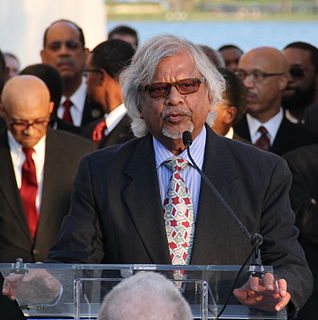A Quote by Phillip E. Johnson
Truth as such is not a particularly important concept in naturalistic philosophy.
Quote Topics
Related Quotes
My position is a naturalistic one; I see philosophy not as an a priori propaedeutic or groundwork for science, but as continuous with science. I see philosophy and science as in the same boat--a boat which, to revert to Neurath's figure as I so often do, we can rebuild only at sea while staying afloat in it. There is no external vantage point, no first philosophy.
There are two threats to reason, the opinion that one knows the truth about the most important things and the opinion that there is no truth about them. Both of these opinions are fatal to philosophy; the first asserts that the quest for truth is unnecessary, while the second asserts that it is impossible. The Socratic knowledge of ignorance, which I take to be the beginning point of all philosophy, defines the sensible middle ground between two extremes.
Satyagraha is the pursuit of truth. My grandfather believed that truth should be the cornerstone of everybody's life and that we must dedicate our lives to pursuing truth, to finding out the truth in our lives. And so his entire philosophy was the philosophy of life. It was not just a philosophy for conflict resolution, but something that we have to imbibe in our life and live it all the time so that we can improve and become better human beings.
Therefore, philosophy does not give sense in mind happiness. It keeps in mind the only truth. However, it is very possible that the truth may be painful, may be distressing, may be destructive of happiness or makes it impossible. Religion, unlike philosophy, is under the category of the useful one. It promises happiness and says what it is necessary to do and what it is necessary to be to deserve or to obtain it. Consequently, illusion is more important than truth if it gets happiness.
One can delineate the domain of philosophy however one likes, but in its search for truth, philosophy is always concerned with human existence. Authentic philosophizing refuses to remain at the stage of knowledge […]. Care for human existence and its truth makes philosophy a 'practical science' in the deepest sense, and it also leads philosophy—and this is the crucial point—into the concrete distress of human existence.
Subjective reason ... is inclined to abandon the fight with religion by setting up two different brackets, one for science and philosophy, and one for institutionalized mythology, thus recognizing both of them. For the philosophy of objective reason there is no such way out. Since it hold to the concept of objective truth, it must take a positive or a negative stand with regard to the content of established religion.
There have been a number of philosophers who have reveled in the dismantling of truth. I think they did so with good ethical motives, and for good philosophical reasons. I can see the sense in what they were talking about; the idea that truth is often claimed by elites in order to further certain agendas. They crowd-out alternative perspectives - particularly those of the powerless. But the undermining of truth contributed - in the weird, indirect way that philosophy contributes to the culture - to a rejection of the idea of truth as having any kind of proper meaning at all.


































